
Bruce Frederick Joseph Springsteen is an American singer, songwriter, and musician. He has released 21 studio albums, most of which feature his backing band, the E Street Band. Originally from the Jersey Shore, he is one of the originators of the heartland rock style of music, combining mainstream rock musical style with narrative songs about working class American life. During a career that has spanned six decades, Springsteen has become known for his poetic, socially conscious lyrics and energetic stage performances, sometimes lasting up to four hours. He has been nicknamed "The Boss".

John Lyon, better known by his stage name Southside Johnny, is an American singer-songwriter who usually fronts his band Southside Johnny and the Asbury Jukes.
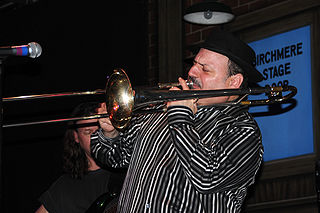
Richie "LaBamba" Rosenberg is an American trombonist originating from Philadelphia, Pennsylvania. He is a former member of the house band on Conan O'Brien's late-night talk shows.

18 Tracks is an album by Bruce Springsteen, released in 1999. All but three selections had been on the boxed set Tracks, released six months before. This single album was intended to capture more casual fans, and thus was oriented towards the shorter, more pop-oriented selections from Springsteen's vault.
Vincent Lopez, nicknamed Mad Dog, is an American drummer. Between 1968 and 1974 Lopez backed Bruce Springsteen in several bands, including Steel Mill and the E Street Band. He also played on Springsteen's first two albums, Greetings from Asbury Park, N.J. and The Wild, the Innocent and the E Street Shuffle. Both during and after his time with the E Street Band, Lopez played drums with numerous Jersey Shore bands.

The E Street Band is an American rock band, and has been musician Bruce Springsteen's primary backing band since 1972. The band was inducted into the Rock and Roll Hall of Fame in 2014. For the bulk of Springsteen's recording and performing career, the band consisted of: guitarists Steven Van Zandt, Nils Lofgren, and Patti Scialfa, keyboardists Danny Federici and Roy Bittan, bassist Garry Tallent, drummer Max Weinberg, and saxophonist Clarence Clemons.
The Miami Horns are an American horn section best known for touring and recording with Southside Johnny, Bruce Springsteen, Little Steven and The Max Weinberg 7. They have also toured, performed or recorded with, among others, Diana Ross, Gary U.S. Bonds, Robert Cray, Bon Jovi, Cissy Houston, Joe Cocker, Dave Edmunds, Darlene Love, The Allman Brothers Band, Eric Clapton, Sheryl Crow and Ricky Martin. As individuals, the various members have also worked with the likes of Aerosmith, David Bowie, Duran Duran, Power Station, Graham Parker and They Might Be Giants.
Ernest Carter is an American drummer. He has toured and recorded with, among others, Bruce Springsteen, David Sancious, Southside Johnny & The Asbury Jukes and Paul Butterfield. During his time with Springsteen, he played the drums on the song "Born to Run". Able to play all forms of rock as well as rhythm and blues, soul and jazz, Carter was formally trained and blends a variety of styles into his drumming. His successor as the drummer with the E Street Band, Max Weinberg later said that Carter devised a jazz fusion part for "Born to Run" that he could never reproduce in concert, and eventually stopped attempting. Although best known as a drummer, Carter is also a guitarist, keyboardist and vocalist and in 2001 he released a solo album, Temple of Boom, singing and playing all of the instruments.
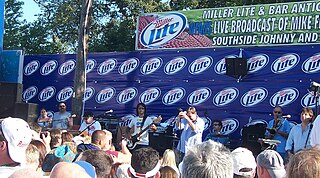
Southside Johnny and the Asbury Jukes are an American musical group from the Jersey Shore led by Southside Johnny. They have been recording albums since 1976 and are closely associated with Bruce Springsteen & The E Street Band. They have recorded or performed several Springsteen songs, including "The Fever" and "Fade Away". Springsteen has also performed with the band on numerous occasions and in 1991 guested on their Better Days album. During the band's formative years Steven Van Zandt acted as the band's co-leader, guitarist, songwriter, arranger and producer while other E Streeters including Clarence Clemons, Max Weinberg, Garry Tallent, Ernest Carter, Patti Scialfa and Soozie Tyrell have all performed, toured or recorded with the Jukes. The band's horn section – the Miami Horns – has also toured and recorded with Springsteen. More than one hundred musicians can claim to have been members of the Asbury Jukes, including Jon Bon Jovi who toured with the band as a special guest during 1990. Bon Jovi has also cited the band as an influence and Jukes' Bobby Bandiera and Jeff Kazee have also toured with Bon Jovi. Other notable band members include Mark Pender and Richie "La Bamba" Rosenberg who have played regularly with the Max Weinberg 7 on both Late Night with Conan O'Brien and The Tonight Show with Conan O'Brien.

Hearts of Stone is the third album by New Jersey rock band Southside Johnny and the Asbury Jukes, released in October 1978. The album peaked at number 112 on the Billboard 200 chart during the week of January 13, 1979. All of the album's songs were written by Southside Johnny, Bruce Springsteen, and E Street Band guitarist Steven Van Zandt. Van Zandt, the band's manager, also produced, arranged and played guitar.
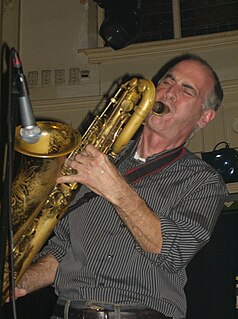
Ed Manion, also known as Eddie "Kingfish" Manion, is an American saxophonist, who plays both tenor and baritone sax. As a solo artist, he released his own instrumental album titled Nightlife in 2015. Manion is currently a recording and touring member of Little Steven and the Disciples of Soul. He was a touring member of the horn section for Bruce Springsteen and the E Street Band and also a member of Bruce Springsteen with The Seeger Sessions Band Tour, later called Bruce Springsteen with The Sessions Band. He is an original member of Southside Johnny and the Asbury Jukes, The Miami Horns, and Little Steven and the Disciples of Soul. As a session musician, he has recorded, toured, and/or performed with, among others, Bruce Springsteen and the E Street Band, Diana Ross, Gary U.S. Bonds, Bon Jovi, Willy DeVille, Dave Edmunds, Bob Dylan, Keith Richards, Darlene Love, Ronnie Spector, Dion, The Allman Brothers Band, Kim Wilson, and Graham Parker. As a solo artist, he released his own CD titled Follow Through in 2004.
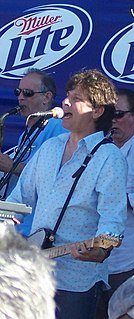
Robert "Bobby" Bandiera is an American rock guitarist, singer, and songwriter from New Jersey. Bandiera played rhythm guitar for Bon Jovi in live performances from 2005 until 2015 and for nearly two decades was lead guitarist for Southside Johnny and the Asbury Jukes. Bandiera and his band have backed Bruce Springsteen at benefit concerts.

"Fade Away" is a 1980 song written and performed by Bruce Springsteen, accompanied by the E Street Band. It is contained on his album The River, and the second single released from it in the United States, reaching the top twenty in both the United States and Canada.

Reach Up and Touch the Sky, sometimes called Reach Out and Touch the Sky, is a 1981 double live album by Southside Johnny & The Asbury Jukes. Released on Mercury Records in 1981 to satisfy the contract of the band, which had recently broken up, it was a moderate commercial success, charting in the United States and reviving the band's flagging sales. It was also critically well received. In 2003, the Rough Guide to Rock indicated that the album was the band's "defining moment".

I Don't Want to Go Home was the first album by seminal New Jersey rock/R&B band Southside Johnny and the Asbury Jukes. The work helped establish the basis of the Jersey Shore sound. It was produced and arranged by manager Steven Van Zandt, who also sang, played guitar, wrote the title song, and elicited the contribution of two compositions by Bruce Springsteen, who also wrote the liner notes.
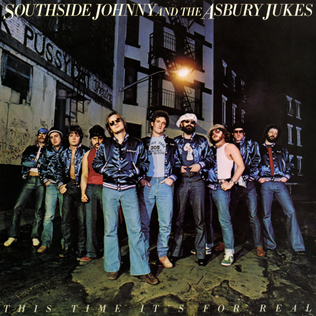
This Time It's for Real was the second album by New Jersey Rock / R&B band Southside Johnny and the Asbury Jukes, featuring three compositions by Bruce Springsteen and Steve Van Zandt, as well as an additional five by the latter. Like their first album, I Don't Want To Go Home, there are a number of guest artists and duets, a trend that would be dropped for their next album, Hearts of Stone. "Check Mr. Popeye" features Kenny "Popeye" Pentifallo on vocals with The Coasters on background vocals. The track "First Night" features The Satins on background vocals and Steven Van Zandt on duet vocals. "Little Girl So Fine" features background vocals by The Drifters. Another highlight is a cover of Aretha Franklin's "Without Love".

Better Days is an album by Southside Johnny and the Asbury Jukes, released in 1991. It yielded minor hits "It's Been a Long Time" and "I've Been Workin' Too Hard". The song "It's Been a Long Time" features shared lead vocals by Southside Johnny, Steven Van Zandt, and Bruce Springsteen and is a reflection back on their early years together in the music business. "I've Been Working Too Hard" features a duet with Jon Bon Jovi. Eight of the eleven songs were written by Van Zandt, harkening back to the Jukes' first three albums which also featured Van Zandt writing, playing guitar, and singing harmony and sometimes duet vocals. One track, "All the Way Home", was written by Bruce Springsteen who later recorded his own version of it for his 2005 solo album Devils and Dust.

"Having a Party" is a song by American singer-songwriter Sam Cooke, released on May 8, 1962 by RCA Victor. Produced by Hugo & Luigi and arranged and conducted by René Hall, the song was the A-side to "Bring It On Home to Me". The song peaked at number four on Billboard's Hot R&B Sides chart, and also charted at number 17 on the Billboard Hot 100.
William Rush is an American musician, guitarist, composer, producer, arranger and engineer who started working professionally in 1964. Rush is especially known for his lengthy association with Southside Johnny and the Asbury Jukes as guitarist and composer and for his work as guitarist and musical director with Serge Gainsbourg from 1984 until 1991.
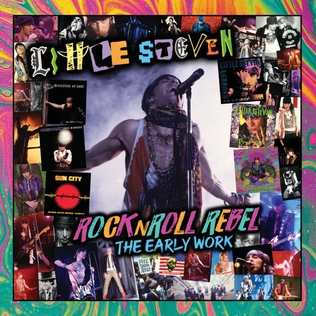
Rock N Roll Rebel: The Early Work is a box set collection by Little Steven, released on December 6, 2019. The set contains Van Zandt's first five studio albums remastered from the original master tapes for the first time ever. The box set also features 51 bonus tracks, including demos, studio outtakes, b-sides, remixes, and live tracks, many of which are previously unreleased. The set also includes the 1985 album Sun City by Van Zandt's protest supergroup Artists United Against Apartheid.

















